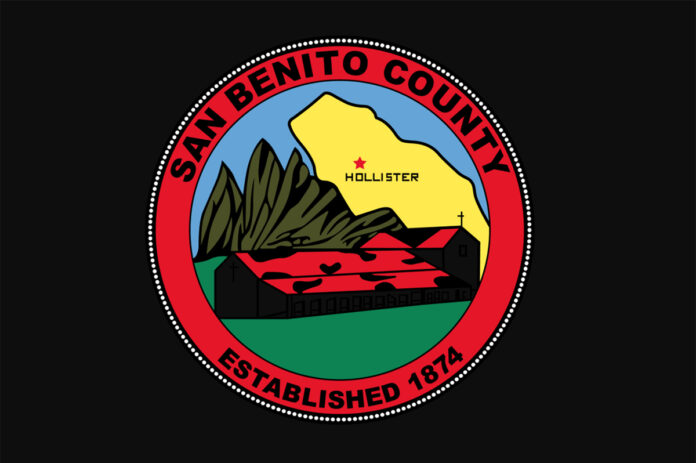After weeks of constant spikes in new coronavirus cases, the San Benito County Board of Supervisors hoped to curtail the public health crisis by passing a new ordinance that could cite individuals and commercial sites for not following state guidelines.
The board held a special meeting Jan. 15 where the supervisors adopted a Covid-19 enforcement penalty, which goes into effect immediately, allowing code enforcement officers, heath officers and other local officials to issue administrative citations to those not in compliance with the state’s regional stay-at-home order that includes San Benito County.
Supervisors Mark Medina, Bob Tiffany, Kolin Kosmicki and Bea Gonzalez voted in favor of the ordinance, while Peter Hernandez was opposed to the idea.
The administrative citations can include hefty fines ranging from $100-$500 for individual violations, while commercial violations can be anywhere from $1,000-$10,000.
Tiffany said that they’re expecting the cities of Hollister and San Juan Bautista will assist to ensure compliance and bring enforcement when necessary.
“The ad hoc committee feels like we simply need to give the county and our cities more tools to ensure that there is proper compliance,” he said.
Tiffany and Kosmicki were appointed to an ad hoc committee to help develop a Covid-19 ordinance, which was proposed countywide.
On Jan. 15, the county reported its 42nd death of the novel coronavirus in San Benito County. This is the sixth death reported this week and the 13th fatality this month.
The county’s Covid-19 dashboard shows that there have been 4,778 confirmed cases and currently 720 active cases, and 80 new cases recorded as of Friday afternoon. It also shows that 19 people are hospitalized within the county, with six of those in the intensive care unit.
Gonzalez said that for the past six months she’s consulted with several community officials, personal doctors, various county residents to solicit their opinions and feelings on the subject.
“We are in a place where we must do something as a board,” she said. “I realize the penalty for the violation is steep and it could be quite costly but without a vehicle to adhere to the enforcement ordinance, we would be doing an injustice to the residents of the community.”
Deputy County Council Reed Gollogly gave a presentation about general code enforcement and specifics related to Covid-19.
Gollogly spoke about the three general phases to a code enforcement action regardless if it’s something related to an illegal structure or somebody having an illegal use or activity on their property.
“The goal is to obtain compliance,” Gollogly said. “The goal is not to impose punitive measures, however, those are often necessary in order to compel compliance.”
The first phase is education and outreach, which means county code enforcement officers from any relevant department or division would be informed of a violation and then verify it occurred. He said the officers are not going to presume based on a single report that some activity was happening.
Instead, the goal is to educate the individuals who they deemed are responsible parties, which can range from the owner of the property to somebody who’s a tenant or an operator of a business establishment that is located on the property.
Code enforcement staff will share information and resources, encourage compliance and allow correction of violation.
“The most important step is to, of course, educate, outreach and provide that person an opportunity to cure the violation,” he said. “They don’t walk out, if you will, and write a ticket immediately on witnessing a violation.”
The following two phases, administrative action and judicial intervention, can occur but only when the violations are subsequent or progress towards abating it hasn’t been made.
The first violation will be a $100 citation, the second is worth $250 and those in violation for a third time can be fined $500.
The commercial violations are also subject to administrative citation but those fines are heftier, starting with $1000 for first time violators. The second violation will cost $2,500, followed by $5,000 for a third and $10,000 for a 4th and all subsequent violations.
Judicial intervention is determined on a case-by-case basis depending on a multitude of factors.
Hernandez agreed with the consensus when it comes to protecting public health in a balanced way. But he believes the ordinance will only increase the spread of the virus because it gives people who are stuck inside at home more of an itch to get out.
“Before we discuss enforcement, maybe we should spend some time talking about the guidance, how is the guidance going to be applied? What is going to be the real world scenario?” Hernandez asked the new ad hoc committee.
Medina said the most common statement he heard during Friday night’s meeting was that the new ordinance would close the doors to businesses.
“It’s far from the truth,” he said. “The state has an executive order that we follow. As Supervisor [Bea] Gonzalez said in her statement, we have to follow these guidelines. We have to follow these executive orders. Only when an opinion comes in, if it is unlawful, will I change my mind about not following an executive order.”
Medina mentioned that in the past he was against enforcing similar ordinances because the death count and positivity rate were much lower at the time, but the times have changed. He emphasized that what they’re enforcing has already been in place.
“We just have to make sure we have the right vehicle to make this happen,” he said. “I don’t expect people of the county or the city to go knock on people’s doors to ensure that there’s only so many people in the household or chase people down that do not wear a mask when they’re walking.”
Kosmicki said the most important thing was to have a comprehensive approach to the enforcement and provide enough tools for the staff to make sure the public is staying safe. He said the priority is for high-risk violators, which is something they really want the focus.
“And to make sure that we emphasize that we’re including large stores [and] household gatherings, two of the main areas that have been criticized from the other side on this issue and that’s something that I certainly agree with them on,” he said.
Kosmicki reiterated that this enforcement ordinance is not meant to punish and the goal is to get through this period of the pandemic, especially with the number of new Covid-19 cases continuing to rise since November.
Tiffany added that it’s their intent and hope that any issues can be handled through education and outreach. He said they want to give an opportunity to both individuals and businesses to comply.
“But unfortunately, as many of us know, in spite of many months of talking about the need to comply there are still many, certainly not the majority, but a significant number of people that continue to defy the safety guidelines,” he said. “There are some, fortunately not a great number, but there are some businesses that continue to defy the regulations in spite of the terrible staticats that we’re dealing with right now.”










